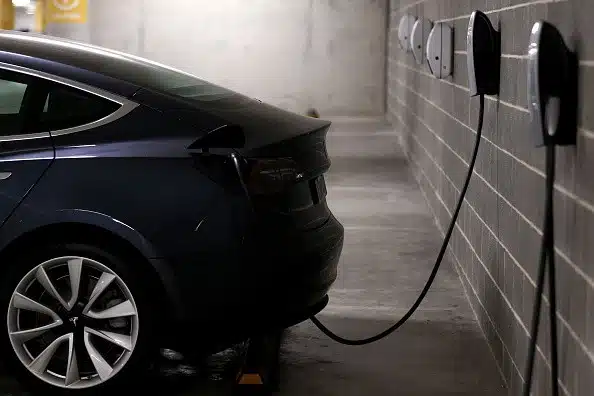
The Complex Truth About Electric Vehicles: Are They Truly Eco-Friendly and Guilt-Free?
December 1, 2023By Ishan Kapur, 2023 Future Blue Youth Council member
Featured Image: “Melting Butter” by Crystal Shin (California)
Over the past decade, electric vehicles (EVs) have gained widespread attention as a greener alternative to traditional cars. They promise lower emissions and a reduced environmental impact, but the truth about their eco-friendliness is more complex than it may seem at first. In this blog post, we’ll explore the multifaceted environmental impact of electric vehicles and whether they truly live up to their guilt-free image.
What Does Being Eco-Friendly Mean?
Before diving into the EV debate, let’s clarify what it means to be eco-friendly. Being eco-friendly entails practices that are not directly harmful to the environment and have a minimal impact on the planet and its ecosystems. However, determining the true environmental impact of any practice, including electric vehicles, can take time due to the complexity of modern supply chains and manufacturing processes.
How Electric Vehicles are Environmentally Friendly
At first glance, electric vehicles appear to be a cleaner choice due to their lack of tailpipe emissions. Here are some reasons why they are considered environmentally friendly:
- Zero Tailpipe Emissions: Unlike traditional vehicles, EVs produce no tailpipe emissions, making them excellent for reducing air pollution in urban areas.
- Improved Efficiency: EVs are highly efficient in converting electricity into power at the wheels, minimising energy waste compared to combustion engines.
- Renewable Energy: EVs can be charged with electricity from renewable sources like wind or solar power, further reducing their carbon footprint.
- Reduction in Greenhouse Gas Emissions: As more people switch to EVs, greenhouse gas emissions, including carbon monoxide and nitrogen dioxide, decrease significantly. This benefits public health by reducing the risk of diseases like lung cancer and heart attacks.

The Harmful Environmental Impacts of Electric Vehicles
While the benefits of EVs are evident, they don’t tell the whole story. We need to consider the environmental impact at various stages of an EV’s lifespan:
- Manufacturing. The production of EVs, especially their batteries, raises environmental concerns. Lithium, a key component, is mined using processes that require vast amounts of water and emit carbon dioxide. This harms local communities and contributes to deforestation and biodiversity loss.
- Consumer Use. EVs are more sustainable during their operational phase, but their economic viability depends on factors like charging infrastructure, energy sources, and long-distance travel. Plus, they’re not as cost-effective as they may seem.
- End-of-Life Disposal. Discarding EV batteries improperly can release toxic-heavy metals into ecosystems, posing a long-term threat to the environment and human health.
Sustainability Considerations
Sustainability involves meeting current needs without compromising the ability of future generations to meet their needs. EVs offer some sustainability benefits:
- Efficiency: EVs excel in converting energy into power, especially in urban settings where combustion engines are inefficient.
- Reduced Reliance on Fossil Fuels: EVs reduce dependence on finite fossil fuel resources, potentially benefiting future generations.
- Renewable Energy: The shift to EVs can drive growth in the renewable energy sector, furthering sustainability goals.
Greenwashing and Ethical Concerns
Greenwashing, or misleading advertising, often portrays EVs as more eco-friendly than they genuinely are. This creates misconceptions among consumers. Additionally, mining rare earth metals for EV batteries involves unethical labour practices, including child labour.
Global Consequences
Aside from the direct environmental impact of electric and traditional vehicles, the secondary impacts must also be considered. Historically, the automotive industry has played a major part in helping the oil industry grow in many nations, such as Saudi Arabia, Qatar, and Russia. Over the years, these nations have grown to be leaders in oil exports, with Saudi Arabia and Russia occupying the number two and three spots for largest exporters of oil, and Qatar being the 14th largest (US Energy Information Administration, 2023). The exports of oil for the purpose of fuel have played a massive role in enriching these nations over the past two decades, with Qatar being the fourth richest country in the world mainly due to its oil. Here, too, greenwashing plays a role, as switching to EVs is viewed as a benefit, especially to youth capable of purchasing vehicles, as it reduces our reliance on nations with poor human rights records and, therefore, reduces their power and influence. This consequently boosts the view that EVs are, in fact, guilt-free – they help reduce our reliance on nations that have a disregard for fundamental human rights.
Conclusion
Electric vehicles have their merits, particularly in urban environments where they reduce emissions and contribute to cleaner air. However, their overall eco-friendliness is marred by complex manufacturing processes, sustainability challenges, and ethical concerns in the supply chain. Making an informed choice about EVs requires considering their total environmental impact and the broader ethical implications.
As consumers, it’s essential to be aware of greenwashing and demand greater transparency from automakers regarding their products’ actual environmental costs. To truly drive positive change, the focus should shift not only to adopting EVs but also to creating a more sustainable, ethical, and eco-friendly ecosystem for electric mobility.
Ultimately, electric vehicles offer a glimpse of a more sustainable future but are not a magic solution. Achieving true eco-friendliness in transportation requires systemic changes, from cleaner manufacturing processes to greener energy sources and a commitment to ethical supply chains.
Sources:
afdc.energy.gov. (n.d.). Alternative Fuels Data Center: How Do All-Electric Cars Work? [online] Available at:
https://afdc.energy.gov/vehicles/how-do-all-electric-cars-work#:~:text=Because%20it%20runs%20on%20 electricity.
International Energy Agency (2020). Global EV Outlook 2020 – Analysis. [online] International Energy Agency. Available at: https://www.iea.org/reports/global-ev-outlook-2020 [Accessed 22 Jun. 2023].
World Health Organization (2022). Ambient (outdoor) air pollution. [online] World Health Organization. Available at: https://www.who.int/news-room/fact-sheets/detail/ambient-(outdoor)-air-quality-and-health [Accessed 16 Jun. 2023].
EV Box (2023). What are electric car batteries made of? | EVBox. EV Box Blog. Available at: https://blog.evbox.com/what-are-ev-batteries-made-of [Accessed 13 Jun. 2023].
Campbell, M. (2022). South America’s ‘lithium fields’ reveal the dark side of electric cars. Euro News. [online] 21 Nov. Available at:
https://www.euronews.com/green/2022/02/01/south-america-s-lithium-fields-reveal-the-dark-side-of-our-e lectric-future#:~:text=In%20Chile [Accessed 17 Apr. 2023].
Rolander, N., Starn, J. and Behrmann, E. (2018). Lithium Batteries’ Dirty Secret: Manufacturing Them Leaves Massive Carbon Footprint. Industry Week. [online] 17 Oct. Available at:
https://www.industryweek.com/technology-and-iiot/article/22026518/lithium-batteries-dirty-secret-manufa cturing-them-leaves-massive-carbon-footprint [Accessed 1 Jun. 2023].
Deb, A. (2016). Why electric cars are only as clean as their power supply. The Guardian. [online] 8 Dec. Available at:
https://www.theguardian.com/environment/2016/dec/08/electric-car-emissions-climate-change [Accessed 13 Jun. 2023].
Moseman, A. (2022). Are electric vehicles definitely better for the climate than gas-powered cars? MIT Climate Portal. [online] 13 Oct. Available at:
https://climate.mit.edu/ask-mit/are-electric-vehicles-definitely-better-climate-gas-powered-cars [Accessed 16 Jun. 2023].
Lovell, J. (2020). EVs: Are they really more efficient? [online] Australian Energy Council. Available at: https://www.energycouncil.com.au/analysis/evs-are-they-really-more-efficient/ [Accessed 12 Jun. 2023].
